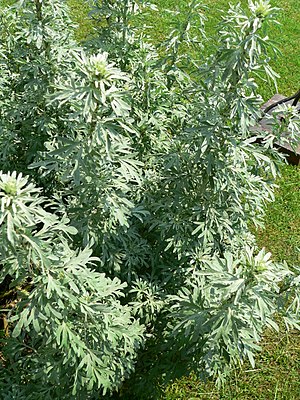Artemisia absinthium
πᾶσά τε ἐπιστήμη χωριζομένη δικαιοσύνης καὶ τῆς ἄλλης ἀρετῆς πανουργία, οὐ σοφία φαίνεται → every knowledge, when separated from justice and the other virtues, ought to be called cunning rather than wisdom | every form of knowledge when sundered from justice and the rest of virtue is seen to be plain roguery rather than wisdom
Latin > Greek
ἄψινθος, ἀψινθία, ἀπίνθιον, ἀψίνθιον
Wikipedia EN
Artemisia absinthium (wormwood, grand wormwood, absinthe, absinthium, absinthe wormwood, mugwort, wermout, wermud, wormit, wormod) is a species of Artemisia native to temperate regions of Eurasia and Northern Africa and widely naturalized in Canada and the northern United States. It is grown as an ornamental plant and is used as an ingredient in the spirit absinthe as well as some other alcoholic beverages
Translations
wormwood
Albanian: pelin i zi, pelin; Arabic: حَبَق اَلرَّاعِيّ; Egyptian Arabic: صبر; Moroccan Arabic: شيبة; Armenian: օշինդր, բարձվենյակ; Asturian: axenxu; Azerbaijani: yovşan; Bashkir: әрем; Basque: asentsio; Belarusian: палын; Bulgarian: пелин; Catalan: donzell; Chinese Cantonese: 苦艾; Mandarin: 苦艾, 中亞苦蒿, 中亚苦蒿; Czech: pelyněk, pelyněk pravý; Danish: malurt; Dutch: alsem; Erzya: шурьма; Esperanto: absinto; Estonian: koirohi; Finnish: koiruoho, mali; French: armoise, absinthe; Galician: absintio, asento, asente, axenxo, alosna; Georgian: ავშანი, აბზინდა; German: Wermut; Greek: αψιθιά, αρτεμισία; Ancient Greek: ἄψινθος, ἀψίνθιον; Hebrew: ארטימיסיה, לענה; Hungarian: fehér üröm; Ido: absinto; Interlingua: absinthio; Irish: mormónta; Middle Irish: mormónt; Italian: assenzio; Japanese: 苦蓬; Korean: 향쑥; Latin: absinthium, batypicron; Lombard: medeghet; Macedonian: пелин; Maori: taru kawa; Middle English: wormwode; Norman: lianne, hèrbe à puches, absînthe; Norwegian Bokmål: malurt; Nynorsk: malurt; Ojibwe: moosewijiibik, moose-ojiibik; Persian: افسنطین, درمنه; Polish: piołun; Portuguese: absinto; Romanian: pelin; Russian: полынь; Serbo-Croatian Cyrillic: пелен, пѐлин; Roman: pelen, pèlin; Slovak: palina; Slovene: pelin; Spanish: ajenjo, absintio, alosna; Swedish: malört, äkta malört; Tagalog: ahenho; Tashelhit: ⵛⵉⴱⴰ; Thai: โกฏจุฬาลำพา; Turkish: pelin; Ukrainian: полин; Venetian: ménego maèstro; Vietnamese: ngải cứu; Walloon: foirt, absinte; Welsh: wermod lwyd
ar: شيح ابن سينا; az: acı yovşan; bat_smg: metīlė; ba: әрем; be: палын горкі; bg: обикновен пелин; br: huelenn-c'hwerv; bs: pelin; co: assensiu; csb: piołën; cs: pelyněk pravý; cy: wermod lwyd; da: havemalurt; de: Wermutkraut; el: αρτεμισία το αψίνθιον; eo: absinto; et: koirohi; eu: asentsio; fa: خاراگوش; fi: koiruoho; frr: weremk; fr: absinthe; ga: mormónta; gl: absintio; gn: ajenjo; hr: pravi pelin; hsb: połon; hu: fehér üröm; hy: դառը օշինդր; io: absinto; is: malurt; ja: ニガヨモギ; ka: მწარე აბზინდა; kk: ащы жусан; ko: 향쑥; ky: эрменшыбак; li: aels; lt: pelynas; lv: vērmele; mk: пелин; mn: агь; mrj: шодышуды; nl: absintalsem; nn: malurt; no: malurt; os: ризæджы хос;: bylica piołun; ps: مستياره; pt: absinto; ro: pelin; ru: полынь горькая; sh: pelen; simsk: palina pravá; sl: pravi pelin; sr: обични пелин; sv: malört; ta: மருக்கொழுந்து; tg: тахач; tr: pelin otu; uk: полин гіркий; uz: ermon; vep: kojeghein; wa: foirt; wuu: 中亚苦蒿; zh: 中亚苦蒿

